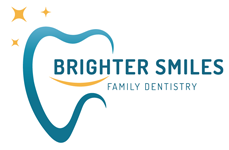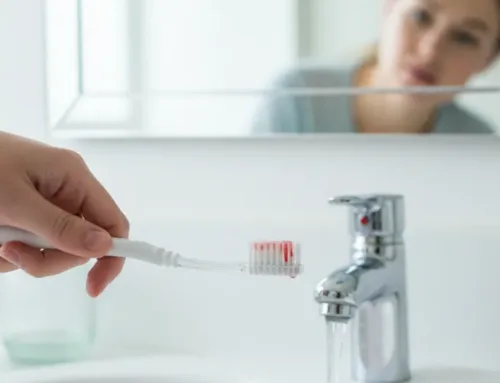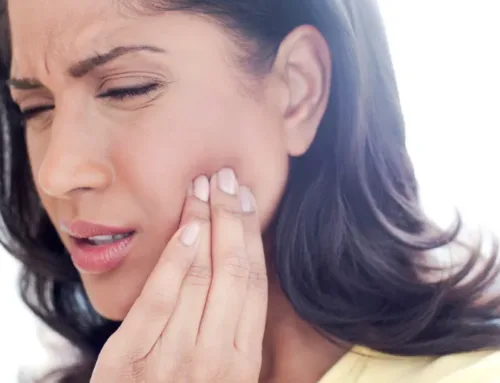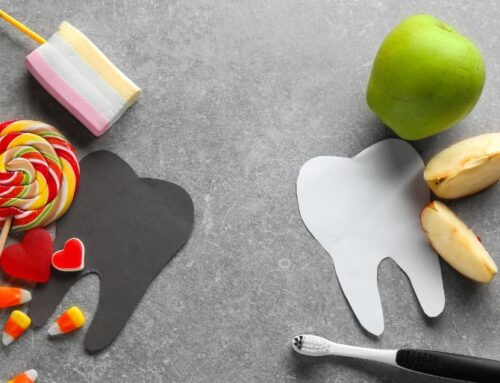What happens if you lose an adult tooth? If not treated quickly, losing a tooth can lead to long-term dental issues.
Whether due to injury or decay, acting fast can help save the tooth or guide you to the best replacement option.
This guide covers what you need to do right away to protect your dental health and avoid further problems.
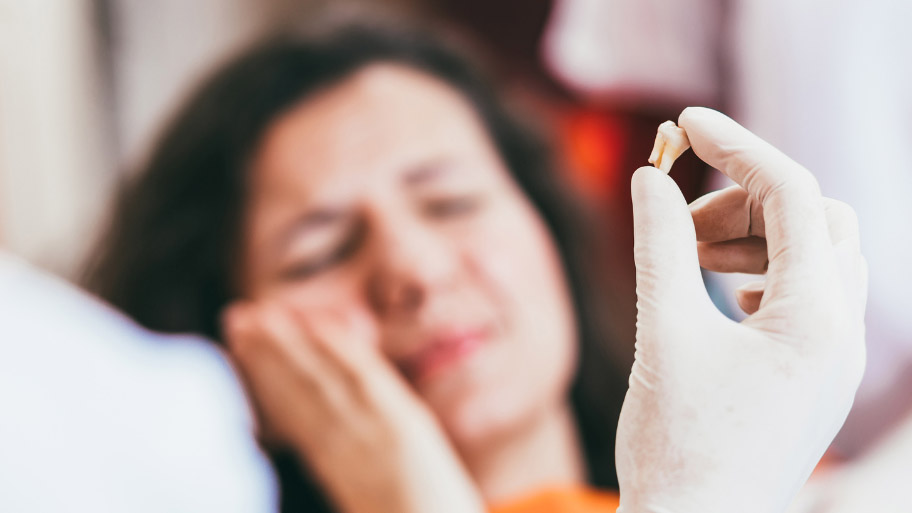
Immediate Steps to Take When You Lose an Adult Tooth
If you’ve just lost a tooth, here’s what you need to do immediately to protect your smile.
Step 1. Find the Tooth (If Possible)
First, try to locate the tooth quickly. Pick it up by the top (the crown) and avoid touching the root—this keeps the tissue intact for possible replanting.
Every minute counts when it comes to saving a knocked-out tooth. Studies show that if the tooth is reimplanted within an hour, your chances of saving it are highest.
After 60 minutes, the chances start to drop significantly.
Step 2. Stop the Bleeding
Apply gentle pressure to the gum using a clean cloth or gauze to stop the bleeding.
If the bleeding persists after 15 minutes, it’s important to seek emergency care immediately to prevent further complications.
Step 3. Protect the Tooth
Keep the tooth moist at all times. The best option is to place it in a container of milk, as this helps preserve the cells on the root.
Milk is better than water because it keeps the cells intact, while water can damage them, lowering the chances of a successful replant.
If milk isn’t available, place the tooth between your cheek and gum for safekeeping.
Step 4. Contact a Dentist Immediately
The clock is ticking! Contact your dentist or head to an emergency dental clinic as soon as possible.
Delaying treatment could lead to complications like infection or permanent damage, so acting fast can save both your tooth and your oral health. Time is crucial to maximizing your chances of success.
Why Do Adult Teeth Fall Out?
Tooth loss in adults can happen for a variety of reasons beyond just accidents. Recognizing these common causes is essential for taking the right steps to protect your teeth and overall dental health.
Common Causes of Tooth Loss in Adults:
Cause #1. Gum Disease (Periodontitis)
When gum disease advances to periodontitis, it starts breaking down the tissues and bone structure that support your teeth.
This can lead to tooth instability and, eventually, tooth loss if untreated. This issue is more common in older adults, with studies showing that around 70% of seniors experience some level of gum disease.
Routine dental checkups allow dentists to detect these issues early, preventing more severe problems later on.
Cause #2. Tooth Decay (Cavities)
Cavities aren’t just surface problems; if left untreated, they can lead to deeper infections, which may eventually result in the tooth being lost.
In more advanced cases, infections can spread beyond the tooth and cause other health issues. Sticking to a routine of brushing, flossing, and seeing your dentist helps prevent cavities from becoming serious.
Addressing cavities early makes treatment easier and prevents further complications.
Cause #3. Trauma or Injury
Accidents or trauma to the mouth, whether from sports, falls, or other impacts, can knock out teeth instantly.
Wearing protective gear like mouthguards is essential for reducing the risk of tooth loss during physical activities.
Cause #4. Poor Oral Care
When you don’t maintain regular brushing and flossing habits, harmful plaque accumulates, which can eventually result in gum disease or cavities—two leading causes of losing teeth.
To avoid these issues, brush with fluoride toothpaste twice a day, floss consistently, and use a mouthwash that targets plaque.
Cause #5. Chronic Health Conditions
Certain medical conditions, such as diabetes, reduce your body’s ability to fight infections, which makes it easier for gum disease to progress.
Those with diabetes face an increased risk of tooth loss due to slower healing and weakened immune responses.
Staying on top of your dental appointments is even more critical if you have a chronic condition like diabetes, as your dentist can help you manage specific oral health challenges.
What Happens If You Don’t Replace a Lost Tooth?
The effects of losing a tooth extend beyond a gap in your smile. If the missing tooth isn’t replaced, it can lead to less obvious but significant issues over time, which can negatively impact your oral health.
Consequences of Not Replacing a Missing Tooth
When a tooth isn’t replaced, nearby teeth can start to move into the gap, leading to changes in your bite.
This can make chewing difficult and increase pressure on the remaining teeth, causing discomfort and uneven wear.
Over time, the bone in the area where the tooth was lost may begin to deteriorate, as it no longer gets the stimulation it needs from chewing.
This bone loss can weaken the jaw and may even alter the appearance of your face.
Oral Health and Alignment Issues
Gaps left by missing teeth are harder to clean properly, creating spaces where food particles and bacteria can settle.
This buildup increases the chances of cavities and gum disease in the surrounding teeth. The longer the gap is left untreated, the more challenging it becomes to maintain proper oral hygiene.
Moreover, the shift in tooth alignment can affect how evenly pressure is distributed when you chew, putting more strain on certain teeth and increasing the risk of further dental problems.
Best Options for Replacing a Lost Tooth
When a tooth is missing, replacing it is essential to restore both functionality and appearance. Here are some of the best options for tooth replacement, each with its unique benefits.
Dental implants are a dependable and long-term option for replacing missing teeth.
During the procedure, a titanium post is positioned in the jawbone, serving as a substitute for the natural tooth root. As healing occurs, the bone gradually bonds with the post, forming a strong base for a replacement tooth.
Implants not only restore both appearance and function but also keep the jawbone active, reducing the risk of bone loss.
A dental bridge is another practical choice for filling in a gap left by a missing tooth.
The bridge attaches to healthy teeth on either side of the space, creating a fixed structure. This approach is less invasive than implants and requires less time to heal.
While bridges can restore both function and appearance, they don’t offer the same benefits in preventing bone loss that implants provide.
Dentures offer a removable solution for people missing several teeth. They can be customized to fit a partial set of teeth or an entire row, depending on the patient’s needs.
Though they don’t provide the same level of stability as implants or bridges, advances in design have made dentures more comfortable and natural-looking.
They are also a more affordable option, and adjustments can easily be made if needed.
How to Protect Your Remaining Teeth
Once you’ve lost a tooth, it’s crucial to adopt specific practices to protect the health of your remaining teeth. Here are tailored strategies to ensure further loss is avoided.
1. Preventing Further Tooth Loss
To protect your remaining teeth, it’s important to target factors that weaken their structure over time.
Consider wearing a custom-fitted nightguard if you tend to grind your teeth, especially during sleep, as grinding can lead to further damage. Another critical step is managing conditions like diabetes or gum disease, which put additional strain on your oral health.
Keeping these issues under control reduces the risk of losing more teeth.
2. Importance of Dental Monitoring for Tooth Replacements
If you’ve received a dental implant, bridge, or denture, regular checkups are even more vital.
Your dentist will check the stability of your dental replacements and ensure that the surrounding teeth and gums are healthy.
Frequent professional cleanings can help remove plaque that builds up around dental work, which is essential for maintaining the health of your remaining teeth.
3. Advanced Oral Hygiene Tips for Adults
For those with dental replacements, proper oral care becomes more detailed.
Cleaning between implants and around bridges is crucial to avoid infections or decay in surrounding teeth. Use interdental brushes or water flossers to clean hard-to-reach areas.
If you wear dentures, ensure they are cleaned daily with a non-abrasive cleaner to avoid irritation or infections in your gums.
Conclusion: Don’t Delay—Take Action to Protect Your Smile
Losing a tooth isn’t just a cosmetic issue—it can have long-term effects on your oral health. Acting quickly can help you avoid complications and keep your remaining teeth healthy.
Take Action Right Away After Tooth Loss
As soon as you lose a tooth, it’s essential to seek professional advice. Prompt action helps prevent potential issues like infection or bone loss and gives you the best chance of preserving your oral health.
Putting off treatment can result in further problems, including shifting teeth and jawbone weakening, making it important to act without delay.
Find the Best Tooth Replacement Option for You
Losing a tooth can affect your daily life, but there are options to restore both function and aesthetics.
Treatments like dental implants, bridges, or dentures are all available to fill the gap. Consulting a dental expert will help you explore these options and select the one that’s best suited to you.
At Brighter Smiles, we offer professional advice to guide you through this decision, ensuring long-term oral health. Take the next step today—schedule a consultation with Brighter Smiles and move closer to a complete and healthy smile.

About the Author
Brighter Smiles Family Dentistry, led by Dr. Melani Fulton, upholds a legacy of exceptional dental care in West Des Moines, IA. Dr. Fulton, a University of Iowa College of Dentistry alumna, specializes in family dentistry and orthodontics. She succeeded Dr. Dan Todd in 2021, continuing a tradition of patient-centered, high-quality dentistry. Committed to gentle, modern treatments, Dr. Fulton’s approach is deeply rooted in community values, ensuring every patient feels like family at Brighter Smiles.
